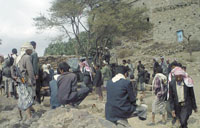
Abducted security commander released [Archives:2007/1116/Front Page]
December 31 2007
 |
TAIZ, Dec. 28 – Sheikh Hameed Ali Abdu, chairman of the General People's Congress (GPC) in Shara'b Al-Salam district, confirmed the release of Abdul-Nasser Al-Qawsi, commander of central security in Taiz, along with six of his escorts, all of whom were held hostage in Al-Aquos in Shara'b Al-Salam.
An armed group comprised of Al-Aquos locals abducted on Wednesday the commander, along with a group of senior officers, using a landmine and gunfire, then looted their cars and kept them hostage for two days in an unknown location.
Al-Qawsi denied that he provoked or confronted any Shara'b district locals. After his release, he told the Yemen Times that what has been said about the incident is “a mere justification for the betrayal” he and his escort were exposed to by some people in Al-Mahjal area in Shara'b. The commander was wrapping up his visit of a military base in Shara'ab, for the purpose of greeting soldiers stationed there.
Al-Qawsi mentioned that he was very surprised when an armed group opened fire at him, killing three of his escorts and injuring nine. He added that the group abducted and held him for three days without harming him.
He went on to say the “betrayal I was exposed to is a criminal act that goes against Yemeni community norms and people should not remain silent,” demanding the arrest and prosecution of the attackers.
Sheikhs and influential figures in Shara'b Al-Salam denounced the incident, considering it a criminal act that must be confronted by society.
The Yemen Times reporter Imad Al-Sakkaf covered the event, going to the place where Al-Qawsi was held. He interviewed Ghamdan Abdul-Salam Al-Qaisi, brother of sheikh Ahmed Abdul-Salam Al-Qaisi (who is accused of planning the attack), who said that the incident came after the commander provoked and insulted them and their father, who was shot dead four months previously at the hands of security personnel. He alleged that they were accused of cowardice and weakness, which caused them to lose their self-control.
Ghamdan also pointed out that the commander visited their area to look down upon them as well as to show off, adding that Al-Qawsi told them that judicial verdicts issued against the killers of Abdul-Sallam Al-Qaisi would not be executed.
Al-Qawsi was released after negotiations and mediation by a number of sheikhs and influential figures from Ibb and Taiz governorates. The intervention came after security forces with tanks and rockets, acting under the orders of the interior minister, were mobilized at the outskirts of the district to launch an attack in the area where Al-Qawsi was kept hostage. The Shara'b locals made preparations to confront the military by placing themselves on mountaintops and in surrounding areas.
Al-Hada district tribes (to which Al-Qawsi belongs) intervened against the Al-Aquos tribes which abducted the commander. An Armed group of Al-Hada tribesmen on Thursday, before the release of Al-Qawsi, crept toward Taiz governorate, where they concentrated at the entrance of the city in preparation to support the security forces planning to attack Al-Aquos.
Moreover, local sources informed that nearly 500 armed Al-Hada tribesmen came to Taiz with 50 cars loaded with light- and medium-sized firearms. The same sources said that the tribesmen found the way to Taiz accessible, as security forces facilitated their passage through checkpoints on the roads between Dhamar and Taiz.
Additionally, the security forces prepared to pursue the suspects accused of engineering the incident. A security source in Taiz told the Yemen Times that Ahmed Abdul-Salam Al-Qaisi was arrested last Friday in Jabal Ra's in Hodeidah governorate, adding that authorities found him in Hais area in Hodiedah and tracked him down until he was finally arrested in Jabal Ra's. He agreed to surrender after negotiations with Hodeidah's governor.
The incident came as a result of the death of Al-Aquos sheikh Abdul-Salam Al-Qaisi, killed four months previously at the hands of central security personnel. Eight soldiers were convicted, three receiving the death sentence and five receiving varying prison sentences.
——
[archive-e:1116-v:15-y:2007-d:2007-12-31-p:front]


